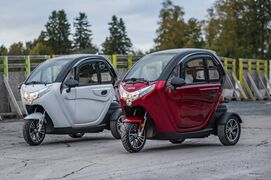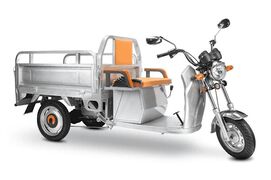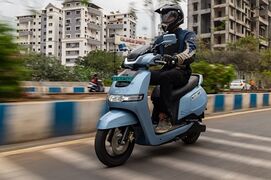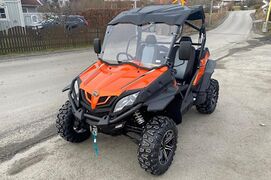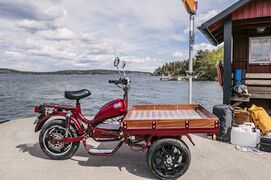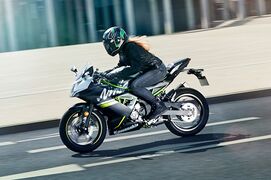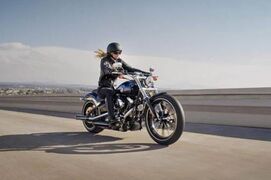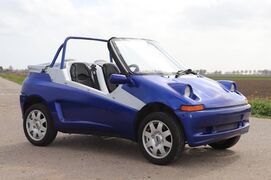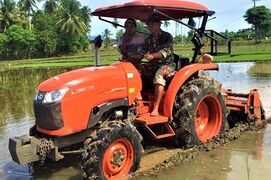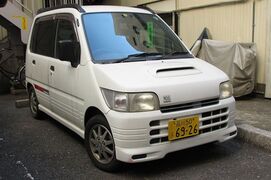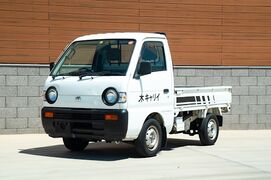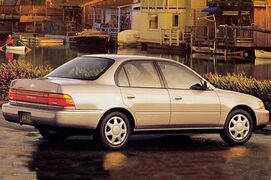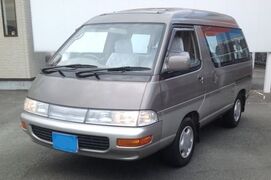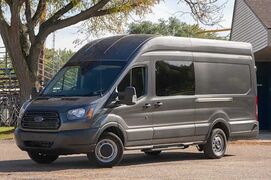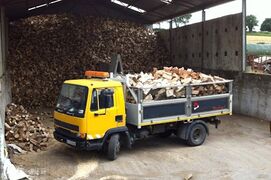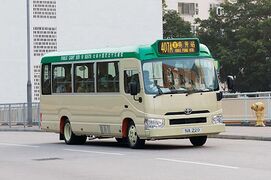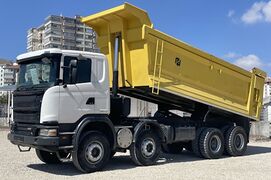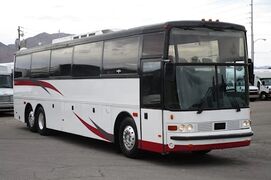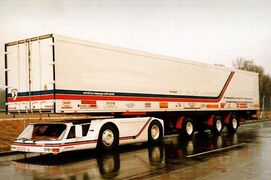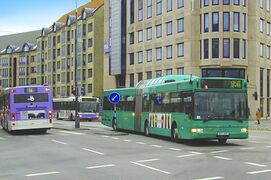Categories of motorised vehicles in Sokoku
The categories of motorised vehicles in Sokoku are a basis for regulation of access, driver's licenses, taxation and insurance premiums. Sokoku has strictly regulated all of these through categorisation, also as a way to formulate tenders for manufacturing of these vehicles, as well as for import of foreign produced vehicles. These production tenders are a prime example of the planned character of Sokokan economy.
The same classification is also used on the consumer side, where not all prospective buyers will be eligible all types of vehicles. A buyer will also have to prove that they have a parking spot at their residence for the vehicle they want to buy or lease. It also regulates which type of driver's license is required to operate such a vehicle.
The different vehicle types are used as a basis for infrastructure and urban planning as well. This means that Sokokan cities are not easily accessible for trucks, lorries and buses. This element has been taken from a Vittmarker example, in this case the city of Månsta that only designated some public roads for motorised vehicles.
Main categories
The main vehicle categories are motor cycles (sepeda), motor cars (mobil) and lorries & buses (kendaraan). These correspond with the driver's license categories A, B and C/D. The defined border between cars on one side and lorries on the other is defined by total operating weight, with cars maxing out at 3500 kgs. The border between motorcycles and cars is defined by the vehicle's empty weight at 625 kgs.
Almost all vehicle categories come in a passenger version (passenger cars, buses) and cargo version (cargo mopeds, vans, trucks, lorries). The passenger versions also have a limit in the number of passengers that can be transported within their category. A cycle car can have 1-2 passengers, a mini car 3, a passenger car up to 6 and mini buses up to 8.
Vehicle height is defined as 4.49 load height for trucks and buses, for cars it's 2.00 m vehicle height or large cars 2,49 m (bus) or 2,99 m (van). Vehicle width for cars is including mirrors, while the width for buses and trucks and lorries is without mirrors.
Variations
Within these main categories there are different types of border between the categories. Within motor cycles it is mainly output effect and maximum speed. Bikes, trikes and quads without bodywork require the driver and passenger to wear a helmet. Trikes and quads with bodywork are usually referred to as cycle cars or motorcars, but based on their weight, size, motor output and maximum speed these are categorised in the Se category.
Cars are mainly categorised further by size with limits of 349 cm, 469 cm and 689 cm car length. The same applies for lorries and buses at 10, 12, 15, 18 and 25 meters. The latter two are always compound or articulated vehicles, with the maximum size of a single vehicular unit being 15.49 meters.
Because of the speed limits on roads outside built-up areas, all vehicle categories have an upper limit in speed. There simply is no reason for a lorry to be able to drive faster than 90 kph if the speed limit is 80 kph. Similar for cars and heavy motorbikes, those all have a limiter at 130 kph. The motor cycles and cycle cars with the indication "90" still have a speed limit of 130, these limits were changed in 7675 and 7685 but the designation remained the same.
Table overview
| Code | Category | Translation | lic. | veh.
weight |
train
weight |
length | width | #wheels | power
output |
max
speed |
|---|---|---|---|---|---|---|---|---|---|---|
| SeDo25 | sepeda dorong v25 | moped cl.2 | AM | 270 | 249 cm | 2-4 | 4kW | 25kph | ||
| SeMo25 | mobil sepeda v25 | AM | 425 | 249 cm | 145 cm | 3-4 | 6kW | 25kph | ||
| SeDo45 | sepeda dorong v45 | moped cl.1 | A | 270 | 249 cm | 2-4 | 11kW | 45kph | ||
| SeMo45 | mobil sepeda v45 | moped car | A | 425 | 249 cm | 145 cm | 3-4 | 11kW | 45kph | |
| SeRi | motor ringan | light mc | A2 | 270 | 249 cm | 2-4 | 11kW | 130kph | ||
| SeDo90 | sepeda motor v130 | motorcycle | A2 | 450 | 249 cm | 2-3 | 15kW | 130kph | ||
| SeMo90 | mobil sepeda v130 | cyclecar | A2 | 625 | 349 cm | 145 cm | 3-4 | 35kW | 130kph | |
| KePe30 | kendaraan perlengkapan | eq. vehicle | A2 | 3500 | 3-6 | 30kph | ||||
| MoRi | mobil ringan | light car | B | 925 | 349 cm | 145 cm | 3-4 | 45kW | 130kph | |
| MoSe | mobil sedang | car | B | 3500 | 469 cm
(499 cm) |
200 cm | 4 | 130kph | ||
| MoBe | mobil besar | large car | B2 | 3500 | 689 cm | 200 cm | 4 | 130kph | ||
| KeBe10 | kendaraan berat L10 | lorry/bus | C/D | 18000 | 1049 cm | 250 cm | 4-6 | 90kph | ||
| KeBe12 | kendaraan berat L12 | lorry/bus | C/D | 18000 | 1249 cm | 250 cm | 4-8 | 90kph | ||
| KeBe15 | kendaraan berat L15 | lorry/bus | C/D | 28000 | 1549 cm | 250 cm | 6-8 | 90kph | ||
| KeLa18 | kereta L18 | combo 18m | C/D | 54000 | 1849 cm | 250 cm | 6-12 | 90kph | ||
| KeLa25 | kereta L25 | combo 25m | C2/D2 | 54000 | 2549 cm | 250 cm | 6-12 | 90kph | ||
| KeAl60 | kendaraan alat berat | heavy eq. veh. | C/D | 54000 | 1549 cm | 275 cm | 60kph |
Example gallery
-
SeMo25 three wheeled moped car
-
SeMo25 cargo moped
-
SeDo45 moped scooter
-
SeMo45 four wheeled moped car
-
SeMo45 cargo moped
-
SeRi light motorcycle
-
SeDo90 heavy motorcycle
-
SeMo90 motorcycle car
-
KePe30 equipment vehicle
-
MoRi mini car
-
MoRi mini cargo van
-
MoSe medium car
-
MoSe medium van
-
MoBe large van
-
KeBe10 light truck
-
KeBe10 small bus
-
KeBe15 lorry
-
KeBe15 large bus
-
KeLa18 large compound lorry
-
KaLa18 articulated bus
Urban and traffic planning
Vehicle categories define which roads a driver can use or not. This has implications for urban planning, where roads and streets for M-type vehicles must at least be 5 meters wide and for Ke-type 6,5 meters (or 2,4 meters and 3,2 meters respectively for singe direction lanes). Even parking lots are adapted for certain vehicle categories. For the MoSe-type it is 2,2 * 5,0 meters, while the MR-type van be parked on 1,8 * 3,8 meters. Usually one is allowed to park in a space one category larger, for example a three or four wheeled SeMo type can park in an MR parking, but not in an MeSo parking.
So road access and parking rules are explained by traffic signs indicating the vehicle type. This is why al vehicles have a decal with the type indication in the upper right hand corner of the windscreen, visible on the in- and outside. Vehicles without a windscreen will have a decal on the right side of the steering wheel or bar.
-
Parking sign for MoSe category (medium cars, 2,2 * 5,0 m).
-
Access sign for zone for Ke-category (lorries and busses) in both directions, indicating a lane width of at least 3.2 meter.
